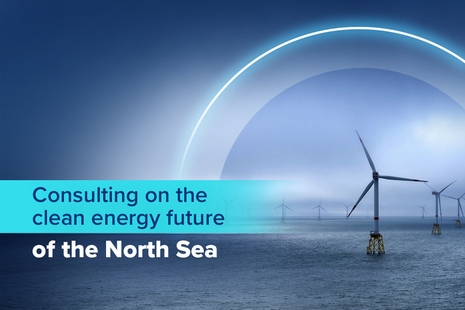The government is consulting on plans to put the North Sea at the heart of Britain's clean energy future and drive economic growth.
UK government consults on plan to unleash the North Sea’s clean energy future and ensure prosperous and sustainable transition for oil and gas
this plan backs industry to make North Sea a world-leader in offshore industries, such as hydrogen, carbon capture and wind, as part of the government’s clean energy superpower mission
it also offers oil and gas industry long-term certainty on the fiscal landscape by ending the Energy Profits Levy and consulting on a new regime to boost investment in jobs and growth
consultation gives certainty to industry about the lifespan of oil and gas projects by committing to maintain existing fields for their lifetime and work with business and communities on a managed transition, while implementing the commitment not to issue new licences to explore new fields
The government has today (Wednesday 5 March) launched a consultation that will put the North Sea – its communities, workers, businesses and supply chains – at the heart of Britain’s clean energy future to drive economic growth and deliver the Plan for Change.
This will support private investment into the technologies that will deliver the next generation of good jobs for North Sea workers, invest in local communities, cut carbon emissions and help the UK become energy secure.
The consultation sets out the next steps in the government’s overarching objective for the North Sea to make it a world leading example of an offshore clean energy industry, building on the UK’s world-class oil and gas heritage. In addition to maintaining existing oil and gas fields, and continuing ongoing domestic production, which have been critical to the UK’s energy system and will continue to play an important role for decades to come, the government wants to boost the economy through the expansion of clean technologies, protecting the country’s energy security in the process. To achieve this, the government needs to ensure the oil and gas industry and its workers can take advantage of a clean energy future.
Separately, HM Treasury and HM Revenue and Customs are confirming that the Energy Profits Levy will end in 2030. They are consulting on what a new regime could look like, to respond to any future shocks in oil and gas prices. The government will work closely with the sector and other stakeholders to develop an approach that protects jobs in existing and future industries and delivers a fair return for the nation, during times of unusually high prices. The government will ensure that the oil and gas industry has the long-term certainty it needs on the future fiscal landscape, helping to support investment and protect businesses and jobs now and for the future.
The government is committed to working with industry, communities, trade unions and wider organisations to develop a plan that will ensure a phased transition for the North Sea – creating tens of thousands more jobs in offshore renewables estimated by 2030.
The government recognises the call of workers and trade unions for a coordinated plan to protect good jobs, pay terms and conditions in the North Sea, and commits to shaping this plan with workers and unions.
The consultation also includes delivering the government’s commitment not to issue new licences to explore new oil and gas fields in the UK, in line with the science of what is required to keep global warming to 1.5 degrees. The consultation also engages with industry on how to manage existing fields, which will continue to make an important contribution during the clean energy transition, for the entirety of their lifespan.
This comes after the government has backed new investment into Scotland’s clean energy future, awarding £55.7 million to the Port of Cromarty Firth, securing critical facilities needed for the rapid development of new floating offshore wind farms and ensuring that they are built from the UK.
By sprinting to achieve this mission, the UK can take back control of its energy and protect both family and national finances from fossil fuel price spikes - with cleaner, affordable, homegrown power. As part of this, Britain must also reduce its dependency on oil and gas, which leaves consumers exposed to unstable global energy markets, as its price is set on international markets.
Energy Secretary Ed Miliband said: "The North Sea will be at the heart of Britain’s energy future. For decades, its workers, businesses and communities have helped power our country and our world. Oil and gas production will continue to play an important role and, as the world embraces the drive to clean energy, the North Sea can power our Plan for Change and clean energy future in the decades ahead. This consultation is about a dialogue with North Sea communities – businesses, trade unions, workers, environmental groups and communities – to develop a plan that enables us to take advantage of the tremendous opportunities of the years ahead."
Diversifying the North Sea industries while domestic production is managed for decades to come is key to protecting its jobs and investment in the long-term. Today’s consultation explores how to harness the North Sea’s existing infrastructure, natural assets and world-leading expertise to deploy new technologies – like hydrogen, carbon capture and storage, and renewables – to create skilled jobs, meet the UK’s climate obligations, and make the UK a clean energy superpower.
It is estimated that the offshore renewables workforce, including offshore wind, CCUS and hydrogen, could increase to between 70,000 and 138,000 in 2030, Meanwhile, an up-and-running carbon capture industry alone is expected to add around £5 billion per year of gross value to the UK economy by 2050.
New proposals could also see changes to the role of North Sea Transition Authority, as the regulator of UK oil and gas, offshore hydrogen, and carbon storage industries. This includes ensuring the authority has the regulatory framework it needs to support the government’s vision for the long-term future of the North Sea and enable an orderly and prosperous transition to clean energy.
The government has already taken rapid steps in accelerating clean energy industries – with the biggest ever investment in offshore wind and up to £21.7 billion in funding over the next 25 years for carbon capture and storage and hydrogen projects. This comes alongside the launch of Great British Energy, headquartered in Aberdeen, and the creation of a National Wealth Fund, both of which will unlock significant investment in clean power projects across the UK and help create thousands of skilled jobs.
The government has also consulted on revised environmental guidance offshore oil and gas projects and will respond to give certainty to the industry and enable developers to resume applying for consents for already-licensed projects. This follows a Supreme Court ruling last year that requires regulators to consider the impact of burning oil and gas – known as scope 3 emissions - in the Environmental Impact Assessment for new projects.
- 12 views







